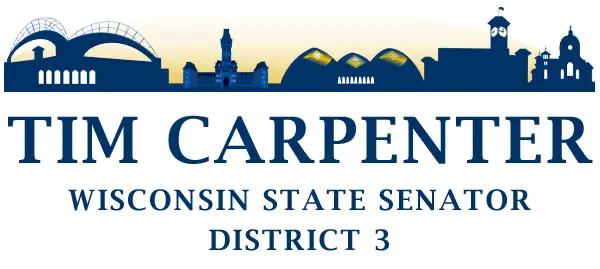Wisconsin Can Lead the Way on Affordable Medications
We Have Blazed this Trail Before with SeniorCare and High-Risk Insurance
(MADISON)—Today, Senator Tim Carpenter issued the following statement after the first meeting of the Governor’s Task Force on Reducing Prescription Drug Prices:
“I am very excited to have a seat at this table, with so many other qualified individuals, to look deep into our medical industry in order to find or create savings for the people of Wisconsin when they go to pick up their life-saving medications. I would like to thank Governor Evers for creating this task force, Senator Shilling for appointing me as a member, and State Commissioner of Insurance Mark Afable and his Deputy Commissioner Nathan Houdek for organizing and leading the discussions at our meetings. The problems of affordability in our healthcare industry are not yet under control, but by putting our heads together and listening to the people and their needs, I am confident that we can find solutions.
“In our first meeting on Wednesday, November 20th, we discussed the set of factors that contribute to the pricing of prescription drugs. Quickly it became clear that there would not be simple fixes to this problem. The supply chain for creating a medication is complicated. When savings are found in one area, it can have the effect of increasing costs in another. To make matters more difficult, all of the stakeholders in the system have so much to gain or lose, that even adjustments that seem minor can turn into hard fought battles.
“It was right of Governor Evers to quickly draw attention to the issues surrounding the affordability of insulin for diabetics. This particular situation illustrates how life-changing the price of drugs can be for a patient, especially one with a chronic condition. It is not acceptable that in the wealthiest country on Earth our fellow Americans are dying because they cannot afford medication and have to balance the price of their prescriptions against paying their bills and putting food on the table. In 2018, a 26 year old Wisconsin man lost his life in the struggle to manage the costs of his insulin after he was no longer able to remain on his parent’s insurance plan. The medication which he had been using was no longer covered under his new insurance. He went through the process of changing his job and insurance plan, but two weeks into a one month waiting period before he could begin using his new plan, he died from the effects of rationing.
“Wisconsin has been a leader on healthcare issues in the past. Before there was Medicare Part D, Wisconsin began its trial of SeniorCare, a comprehensive prescription drug benefit for Wisconsin seniors at or below 200 percent of the Federal Poverty Level. In the ‘70s, Wisconsin created the Health Insurance Risk-Sharing Plan which offered health insurance to state residents who could not purchase adequate private coverage due to a medical condition. Both of these Wisconsin ideas can now be found in our national policies. Governor Evers and the members of the task force can see that there are more innovations waiting to be realized. Once again, Wisconsin has the chance to move our nation Forward.
“In the coming months, the task force will be looking into different areas of the healthcare industry such as: Pharmacy Benefit Managers; insurance models; Pharmacy Services Administration Organizations; manufacturers; and more, in order to identify the best methods to impact prescription drug affordability directly and immediately. Wisconsin patients deserve action on this issue, we cannot afford to wait.”
###
